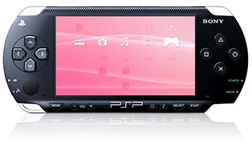This one comes from a recent Samsung convention, revealing some sort of memory unit for the device, either designed for the existing unit or a future revision. Even though it would be awesome to have an HDD, I’m inclined to think that it really won’t save the PSP.
 |
Technically, the PSP isn’t a bad system. It has all the pieces to make it a great machine, but Sony has done a horrible job making it useful.
First, regarding its multimedia capabilities, you can’t really watch anything unless it’s been properly converted. They gave us the Media Manager (which isn’t free, by the way), and the online community has given us PSP Video 9, the ultimate converter for the PSP. But if you want to watch video on the PSP, you have to learn about it first. And who really cares that much to go through all the hoops for it? Hardcore gamers probably would, but not the mass-market.
As for music, it’s a little bit better. At first it was only ATRAC and MP3, but Sony has finally given us AAC and WMA through the updates. But it still isn’t as intuitive as it should be. Basically, it should have been like iTunes. It needs to do its own thing while the consumer just waits until the loading bar finishes.
In an automatic world, the PSP is just way too manual. Sony needs to correct all these mistakes before even considering releasing a successor.
And then you actually need what a games system is built for: games. To be truthful, it really isn’t Sony’s fault that the system has a fairly lackluster games library. They have made about the same number of first-party titles at this point that they did with the PS2. This seems more like a lack of motivation with third-party developers to me. They just seem to rehash their console titles, even when the system has a clear lack of available buttons. At some point, consumers probably realized the PSP was merely a dumping ground for games we already played.
Having an HDD would be great, though. It would take away the need to keep buying larger Memory Stick PRO Duo’s, letting people download movies and games without having to worry about maxing out their available memory storage.
But think of all those people that just bought a PSP. They just dropped at least $200 on it, and then you expect them to turn around and pay more? And we all know adding an HDD will probably add at least a hundred dollars to the price, for a grand total of $300. That’s a hefty price for correcting a mistake. The N-Gage already tried that, and look where that got them.
If Sony is planning some huge push to make the PSP a constantly connected service like iPod or Xbox Live, then that would be great. I don’t see it coming, especially from someone like Sony, but it would finally get people to dust the sucker off.


I have no issue with the PSP. Even the games no are more tolerable. I am not looking for a console replacement. I have quite a few so If I go out on the road and have a portable version of a PS1 or 2 game I cannot really complain. Powerstone, MGS ops, loco roco, valkyrie profile and many others have helped me to enjoyable pass the time while I wait somewhere or go on a trip. The issue here is that way to many people hold the PSP to a standard that really has no bearing in day to day usage.
When you say that some of the PSP’s features have no bearing in day to day use, are you saying that the music/video/photo shouldn’t be accounted for when talking about the PSP? I just want to make sure that’s what you meant.
PSP stands for Proprietary System Prevails. History of Sony reveals proprietary Blunders like Beta Video recorder. Apple and Sony business practices are often confused as one they both tend to think that proprietary is the key to profit. Anyone that has followed their product survival should agree that proprietary, either hinders development or causes higher expense to in house engineers to keep up with demand for product improvement to keep existing consumers and acquire new ones.
I will say that UMD could have been successful if the price was right. No one bought it because they saw they could just get a DVD for an average of $5 less, and the DVD came with more content, and the ability to play on multiple machines. If they sold UMD’s for 10-15 dollars, it could have been very successful. Blame this blunder on end-price, not technology. I can’t imagine those tiny discs costing so much in manufacturing that it increased the price over a standard DVD.